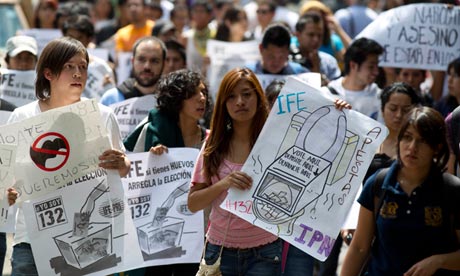Campaign group says 28% of voters it interviewed were exposed to vote-buying or coercion

A protest in Mexico City against alleged
voting irregularities in the country's presidential election.
Photograph: Eduardo Verdugo/AP
Growing allegations of systematic vote-buying and other irregularities are casting a shadow over Enrique Peña Nieto's still unconfirmed victory in Mexico's presidential election.
The
preliminary count from Sunday's poll gave Peña Nieto of the
Institutional Revolutionary Party, or PRI, about 38% of the vote and a
six-percentage-point lead over Andrés Manuel López Obrador of the
leftwing Party of the Democratic Revolution, or PRD, who is contesting
the result.
The most notorious pre-election allegation was that
the PRI distributed huge numbers of cards for pre-paid purchases at the
Soriana supermarket chain in return for votes. This appeared to be
confirmed this week when shoppers rushed to use the cards, worth between
100 and 700 pesos (£5 to £35). Soriana has denied any wrongdoing.
Other
alleged irregularities include the PRI's use of children to accompany
voters into polling booths to check how they mark their ballots,
reported by the Mexican organisation Civic Alliance. The group issued a
report saying 28% of those interviewed by its 500 observers across the
country had been exposed to some form of vote-buying or coercion.
Gift-giving during electoral campaigns is permitted but making it
conditional on votes is illegal.
The PRI party machinery has long
been famous for using handouts and intimidation to push the limits of
the law, particularly in poor communities. Other political parties are
also regularly accused of doing the same in their own bastions, though
on a smaller scale.
This election, however, has exposed these
practices as never before thanks to the explosion of mobile phone
ownership and social media, as well as the activism of the new anti-PRI
student movement that erupted in May.
YouTube, Twitter and Facebook have been abuzz with videos and accounts of alleged dirty tricks, such as women apparently collecting bags of handouts under cover of night before the election.
In another video
two people from the state of Puebla say they were bussed to the state
of Veracruz to vote for the PRI, supporting charges of a party operation
to use up the limited number of ballots available at polling stations
where vagrant voting is permitted.
Another video shows people who say they were hired to supervise polling stations for the PRI protesting about not being paid yet.
Although
such charges may damage Peña Nieto's claim to represent a "new
generation" of PRI politicians, few observers expect the upcoming legal
challenges to prosper given the 3 million vote margin of his victory,
and the high standard of proof required by the electoral courts.
Meanwhile,
the PRI insists the election was fair. "Enrique Peña Nieto will be a
legal and legitimate president," his campaign manager Luis Videgaray
told MVS Radio on Wednesday. He nevertheless added: "Of course our
democracy is perfectible."

No comments:
Post a Comment